The Assassination of Jesse James by the Coward Robert Ford is an eloquently artistic, poignant portrait and eulogy of the notorious 19th century American outlaw, Jesse James. The film bears an extraordinarily (and unnecessarily) long title, much like the picture it has been slapped on. This grandiose piece of filmmaking clocks at approximately 150 minutes. It's a grand achievement in contemporary filmmaking that merges visual artistry with historical storytelling.
Director Andrew Dominik is no foreigner to films that depict iconic thugs, as his previous directorial outing was the Australian film Chopper. Dominik adopts an expressive approach with this production, essentially mirroring the works of Terrence Malick who's recognised for films such as The New World and The Thin Red Line. Dominik (who adapted the screenplay from Ron Hansen's book) and his director of photography Roger Deakins have consciously striven to accentuate aesthetics, character relationships, atmosphere and tone over pure action. The Assassination of Jesse James by the Coward Robert Ford desires for its audience to witness and admire the mood, the panorama and the scenery, all whilst you cogitate on the vagaries of the dialogue.
If you're searching for a definitive classification of "post-production hell", then Dominik's The Assassination of Jesse James by the Coward Robert Ford wears it with aplomb. The movie wasn't finally released until roughly 2 years after filming concluded. No studio agreed to fund the film's worldwide release as they weren't confident it was going to generate much of a box office return. Studios feared the film's running time was not going to please a mainstream audience. Dominik's original cut wore a running time of almost 4 hours. Preceding the film's eventual release, years passed by as people were hired to trim the film down to a more serviceable length. The concerns, the reasoning behind delay and the decision to only grant the film a limited release is understandable. The studio pushed for more action as only one robbery was depicted; however it was Dominik's intention to explore the philosophy behind the characters with dialogue as opposed to action.
In the long run, The Assassination of Jesse James by the Coward Robert Ford is a magnificently filmed picture, and it articulates a meticulous and edifying story. The film works hard in bequeathing accurate insight into both the mindset and the multi-faceted existence of the legendary outlaw. The film illustrates the duality of Jesse James' character: he was a family man who used an alias around his family, but was a psychotic bandit who slaughtered without remorse and made his living by robbing trains and banks with his loyal gang. The timidity and paranoia that surrounded Jesse James is elucidated in a protracted and prolonged manner. A mainstream Hollywood audience would yearn for action and more robberies to unfold, but the majority of this 150-minute production delves into the psychological facets of Jesse James and his killer Robert Ford. That said, the film's highest point is the initial train robbery. It's an artistic achievement boasting expressive angles, crisp complexion and a fantastic use of lighting. Perhaps more of Jesse's robberies scattered throughout the film could have guaranteed stronger viewing.
The tale commences on September 7th, 1881, just before the James boys staged their final railroad hold-up. At this time Jesse James (Pitt) was 34 years of age, and it was one year before Robert Ford would gun him down in a famous act of cowardice. The Assassination of Jesse James by the Coward Robert Ford chronicles the final year of Jesse James as we deeply examine his increasing paranoia and reluctance to trust even his closest comrades in fear they would kill him for the reward money and the glory. Robert Ford (Affleck) idolised Jesse James in his early youth, and desires to join the James gang to become a somebody. As the months pass by and Jesse grows increasingly paranoid, Robert Ford becomes resentful of the Missouri outlaw. Moreover, Ford believes his days are limited and that Jesse would soon shoot him. These facts become the motivation for Ford to pull the trigger on a man he once revered.
The critical reception for The Assassination of Jesse James by the Coward Robert Ford was a mixed bag. Only a selected few could recognise the sheer brilliance underneath a cloak of visually striking images. The film isn't anything further than a unique visual splendour: the exquisite photography impeccably captures the breathtaking locations and sets. Several particular shots continue to haunt me due to the framing. One such instance is Jesse James appearing out of a cloud of smoke. I remember seeing this shot in the trailer back in 2006. Two years on, and it stuck in my mind when I finally watched the film. This is a testament to the wonderful filmmaking being offered.
The music is also evocative and memorable. There are various particular segments of music (composed by Nick Cave) that are repeated at different times. The music is perfect...an intriguing creation to perfectly compliment the photography.
The film's title could easily have been trimmed down to half its length. Coincidentally, the same can be said about the film itself. This only provides the definitive history of Jesse James in his final year. However the narrative grows too convoluted and the dialogue too stilted. While the visuals are striking and the acting stellar, several scenes appear unnecessary and out of place. Much of this Jesse James saga never adds to the story being told. The film could have worked had it not been so long. At the end of the day, 95% of it is talk. Certainly, there are a few remarkable conversations, the landscape is elegant and the silences are telling. But ultimately, we're left with the feeling that the filmmakers have spent a dreadfully long time telling a straightforward and proverbial tale, offering few or no groundbreaking insights. And furthermore, the final 30 minutes appear to be milking the plot as Robert Ford boasts about the assassination. Most of this should have been removed as things grow tedious and boring.
The cast deserve lauding of the highest honour for their delicate portrayals. Brad Pitt is absolutely sensational as the title's namesake. Pitt gives the character everything he can, but could have been far better had the script allowed him something more to say. The script offers nothing but excessive character banter, and the narrative should have been far more succinct.
Casey Affleck is nothing short of amazing. With fantastic performances like this, it's a wonder why his brother Ben is more well-known. Casey Affleck's character is young, naïve and displays a clear-cut traitorous side where he is completely intent on becoming his own celebrity. Affleck demonstrates intelligence in his portrayal as Ford as well as a deep emotional side that was essential for the film's success.
Sam Shepard is amazing, as is Sam Rockwell and the rest of the supporting cast. If there's one compelling reason to view this film, it's for the performances from the entire cast.
Overall, The Assassination of Jesse James by the Coward Robert Ford is an essential contemporary masterpiece. The film feels like a history lesson with magnificent paintings telling the tale. Jesse James was an inimitable personality and one of the legends of American history. This movie paints a faithful story of James' undoing, and final days. It also supplies the reasoning why he was assassinated by an individual whom he considered a friend. Both Brad Pitt and Casey Affleck put forth excellent performances that denote the high water mark of this film. The film is a leisurely paced, ponderous Western that occasionally transcends its gawky determinations to create memorable cinema. Perhaps with a more concise running time or reasoning for its length, this majestic film could have been further improved.
8.1/10
A breathtaking epic...
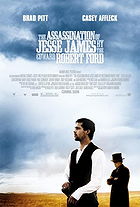 Posted : 16 years, 10 months ago on 16 August 2008 01:24
(A review of The Assassination of Jesse James by the Coward Robert Ford)
Posted : 16 years, 10 months ago on 16 August 2008 01:24
(A review of The Assassination of Jesse James by the Coward Robert Ford) 0 comments, Reply to this entry
0 comments, Reply to this entry
Enjoyable pure actioner!
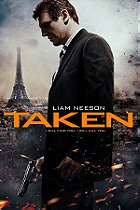 Posted : 16 years, 10 months ago on 15 August 2008 09:08
(A review of Taken)
Posted : 16 years, 10 months ago on 15 August 2008 09:08
(A review of Taken)
Taken is an invigorating, exciting, feverishly-paced action flick, and one of the most overlooked and underappreciated screen gems of 2008. It's thrilling, tightly-told, energetic, utterly relentless, and consummately entertaining. Adhering to the current trend of contemporary action movies (such as the Jason Bourne series), Taken is a film that employs gritty realism in its amazing action sequences. It also portrays a badass, greatly skilled protagonist distributing punishment to those who deserve it. This is unquestionably one of 2008's best action movies (alongside Rambo). It succeeds so admirably on account of its shameless stance as a pure actioner; ingeniously eschewing elaborate plot twists in favour of adrenaline-pumping action and fast-paced developments. It ensnares you in its (admittedly slender) plot following necessary character development...allowing little respite in its build-up to an incredible climax.
The plot is derived from the concept of human trafficking which has become a major issue in today's society. This issue is used as a foundation on which to construct a revenge-driven, fast-paced action thriller.
Bryan Mills (Neeson) is a former United States government operative. Now retired and separated from his estranged family, the desolate and emotionally sheepish divorced father is working towards a more solid relationship with daughter Kim (Grace) who now resides with her mother (Janssen) and rich step-father (Berkeley). Bryan has developed into a particularly overprotective father given that his career made him more vigilant, and he is hesitant when his daughter requests his permission to travel to Paris with a friend. Despite his initial scepticism, he eventually allows the trip to proceed. Soon following their arrival in Paris, Kim and her friend are kidnapped, and will most likely be sold into the slave trade. Bryan - who describes himself as "retired, not dead" - employs the skills he acquired in his former career as an assassin to rescue his daughter...leaving a shadow of carnage and corpses in his wake.
Taken is an action movie that effectively draws inspiration from Death Wish and Man on Fire, with traces of the Bourne series as well. For the most part, the film is largely clichéd and formulaic. It doesn't matter that the thin story is painfully predictable and occasionally unoriginal (Commando, anyone?), because - as with any action flick - it's all about the execution. Taken delivers hard-hitting, bone-crunching action sequences. Exhilarating car chases and shootouts are the notable highlights, which satisfyingly compensate for the lack of originality. In terms of violence, the film is unflinching. Bryan's victims regularly meet with terrifying ends. Pierre Morel's intuitive and astute direction is spot-on. The violence is never over-the-top, and the bloodshed never exudes any trace of exploitation. Bad guys are dispatched, and Bryan immediately advances to his next victim. The action is drenched in realism - they're filled with impressively choreographed close combat conflicts and first-rate stunts. These sequences are always kept electrifying and concise. Director Morel utilises the dreaded plague of quick cuts and rapid editing; however he's graceful enough to ensure an audience always knows what's happening. The thunderous, dynamic sound mix also effectively conveys the viciousness of each punch and the sharp crack of every gunshot.
Driving the film is a sublime screenplay penned by Luc Besson with his Transporter collaborator Robert Mark Kamen. Besson is perhaps best known for his 1994 film Léon (also known as The Professional). Revenge movies are tricky beasts to master without deteriorating into bullshit territory. There are numerous clichés pervading the film. Nevertheless, the screenwriting duo commendably manages to circumvent the more obvious clichés. For instance: characters aren't ever treated with any sentimentality, and when the central villains enter the picture there are no absurdly lengthy speeches or special deaths...Neeson instead just pulls the trigger or cleverly improvises with surrounding objects. Even better, the action begins once a story has been established. There's effective character development before the descent into violence and carnage initiates. For its first 20 minutes, Taken is almost a family drama. The script delves into Bryan's private life, providing the audience with an emotional attachment to the characters. Bryan is also an excellently unconventional anti-hero. During his investigation he comes across several additional drugged-up teenage prostitutes. Instead of playing big hero and rescuing them all in a stroke of nobility, he sticks to his personal mission. The film couldn't afford to get bogged down, and it never does.
For the most part, the acting is top notch. Liam Neeson has found his calling as an action hero. We've seen him in Star Wars and 2005's Batman Begins, but he quickly masters this particular character. The American accent is surprisingly believable as well. Even at 56, Neeson is an ass-kicking hero who can certainly dispatch his intended targets efficiently.
Famke Janssen is passable as Neeson's estranged wife, and Maggie Grace delivers a convincing performance as Neeson's kidnapped daughter. Her role called for depth, and the young actress pulls it off. The villains, though slightly stereotyped, are terrific as well. Even Holly Valance shows up in a supporting role, and she does a decent job.
It's worth noting that, while the film isn't a preachy social commentary, it capably spreads awareness of global happenings in relation to the human slave trade as young girls are sold into prostitution while the police let it happen. (In fact the film encouraged actress Famke Janssen to take action in the real battle against corruption. Janssen now serves as the Goodwill Ambassador for the United Nations Office against Drugs and Crime.) With this realistic edge the story is far easier to believe.
Regardless of the negative reviews it was compelled to endure, Taken is a thrilling film - one of 2008's greatest action movies. Saturated with intense action, credible characters and a realistic story, this is simply an essential movie for the action lovers. Many have classified the film as The Bourne Retirement, and that's understandable. Neeson's aging action hero persona is equally as skilled as Matt Damon's Jason Bourne. Taken is a stimulating, breathtaking action movie that deserves to be seen. Granted, there are dumb bad guys and cheesy dialogue...but the action is highly satisfying. Face it; that's why you wanted to see the film in the first place. You seek pure entertainment with action aplenty, you want to see villains getting their comeuppance, you want to be rooting for the hero and you want to be cheering when something badass occurs. On that note, Taken delivers. It's a shameless, enjoyable pure actioner and a powerhouse, roller-coaster action flick of enlivening proportions.
8.0/10
 0 comments, Reply to this entry
0 comments, Reply to this entry
Average comedy/drama
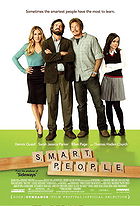 Posted : 16 years, 10 months ago on 15 August 2008 06:04
(A review of Smart People)
Posted : 16 years, 10 months ago on 15 August 2008 06:04
(A review of Smart People)Chuck: "But, how do you know what tone I was trying to set?"
Dysfunctional family comedy-dramas have developed into an unusual beast over recent years. After the rowdy success of Little Miss Sunshine, it appears that filmmakers have grown relatively inspired to replicate the charm and quality of that memorable 2006 screen gem. Smart People is one of these recent attempts. Unfortunately, the wrong creative team were pulled onto the project: screenwriter Mark Jude Poirer had never scripted a feature film before, and director Noam Murro hadn't directed one.
The central problem is that the film concentrates too extensively on the 'smart' without focusing on the 'heart'. Poirer adds various offbeat and oddball elements into the film, as well as smart scenes and smart lines. It's lacking both charm and energy. The interesting characters, as well, are never treated properly. Despite the presence of an ideal cast, they never let us in. We're unexpectedly thrown into a world of eccentric characters as if we're already supposed to know them. Consequently, things get very boring very quickly and we seldom feel for the characters. No charisma, no memorable laughs, and no point!
Lawrence Wetherhold (Quaid) is a self-absorbed English professor specialising in Victorian literature. He may be intelligent, but he's an appalling teacher deficient of passion and his students detest him. Moreover, when it comes to love and family he's completely bewildered. He's been lonely since his wife died many years ago, is anti-social, has drifted away from his college-aged children, and hates his brother Chuck (Church) whom he insists on describing with the adjective "adopted". Coincidentally, practically everyone he meets is a former student of his who have bad memories of his teaching. Following a head injury, Lawrence meets young physician (and former student of his) Janet Hartigan (Parker) whom he predictably falls for. Meanwhile, Lawrence's brother Chuck turns up for an unexpected stay.
Smart People is a straightforward, reasonably predictable drama/comedy hybrid. The laughs are unfortunately quite trifling and never are there any laugh-out-loud moments. Worse yet, nothing is particularly memorable. Curiously, the material is rarely convincing as well. I mean, the town is supposedly dominated by Lawrence's ex-students. Isn't Pittsburgh a large place? And moreover how can so many former students actually remember him after so many years? Why would an ex-student be so quick to jump into bed with him? These are instances when the screenwriter isn't displaying any smartness.
Like I previously mentioned, I frequently found the film irretrievably boring. The central idea of brainiacs possessing deficient emotional IQs only goes so far. Usually in the genre we expect a massive moral wake-up or a character revelation. It's too subtle and inadequate for us to notice or care about. The clichés can't be avoided either. Of course there's the unplanned pregnancy, the predictable love story with the conventional problems, and even worse is the characters learning to respect each other. Usually this makes for feel-good viewing, but it isn't handled well. More invasive is the soundtrack, composed by Aussie Suze DeMarchi and hubby. The tracks themselves are fine...the problem is that they're slathered over every scene: overbearing and booming over the actors' lines.
One of the film's redeeming features is the ideal cast (for the most part). Dennis Quaid isn't too bad. Sometimes he fails to engage us, but this is attributed to the poor screenplay.
Ellen Page recaps her Juno performance, except less impressive: she's as sharp as a knife; however she isn't hip or energetic enough. She's idyllic for the role...the flaws are just in the way her character was written.
Sarah Jessica Parker is truly appalling. She's aged since her Sex and the City days and isn't convincing nor charming. I have no idea why she keeps acting.
Thomas Hayden Church and Ashton Holmes are impeccable but misused.
Overall, Smart People didn't live up to its potential. There are some creative concepts marred by lack of heart or appeal. It frequently plods and should have been tighter for an elevated entertainment value.
5.8/10
 0 comments, Reply to this entry
0 comments, Reply to this entry
Excellent and original thriller!
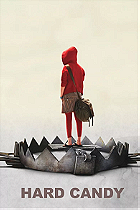 Posted : 16 years, 10 months ago on 15 August 2008 02:58
(A review of Hard Candy)
Posted : 16 years, 10 months ago on 15 August 2008 02:58
(A review of Hard Candy)Hayley: "Oh, come on. That's what they always say, Jeff."
Jeff: "Who?"
Hayley: "Who? The pedophiles! "Oh, she was so sexy. She was asking for it." "She was only technically a girl, she acted like a woman." It's just so easy to blame a kid, isn't it! Just because a girl knows how to imitate a woman, does NOT mean she's ready to do what a woman does."
Hard Candy is an incisive, stylish, provocative, innovative, edge-of-your-seat psychological thriller that is effortlessly superior to an abundance of other contemporary horror films. Saw and Hostel probe the concept of cold-blooded killers, frequently displaying gratuitous violence and gore, whereas writer Brian Nelson and director David Slade circumvent the clichés and produce a wholly original thriller. Paedophilia is a key concern in recent society. Slade and Nelson use this issue of paedophilia as a foundation on which to build the plot and story. Gone is the senseless slasher tone and the unnecessarily gory deaths...Hard Candy is potent and relentlessly intense with minimal quantities of gore. The tension is instituted through the powerhouse performances and elegance in the camera techniques. Slade's solid direction keeps the situations tight and the characters compelling. Even better, the film's most riveting sequence is scary not due to the gore, but the suggestion of what's occurring. Throughout every scene, the director will keep you rapt and immersed...the proceedings are also unpredictable, which makes the film far more terrifying.
Fundamentally a two-person drama, the story concerns a typical case of paedophilia with the tables reversed. Hayley (Page) is a precocious, teasingly sexy 14-year-old girl who befriends charming, boyish 32-year-old photographer Jeff (Wilson) over the internet. They've been chatting online for three weeks, and eventually decide to meet in person at a coffee shop. Before long they're travelling back to Jeff's home for an impromptu photo-shoot. Hayley's malevolent secret agenda is soon revealed: she suspects Jeff of being a paedophile, and commences a hard-hitting investigation in an attempt to reveal his possibly scandalous past.
Slade keeps remarkable control, steadily divulging information in a sequence of moments that delicately develop suspense, anxiety and most significantly it cultivates scepticism about the true identities of Hayley and Jeff, what they've done and what they're going to do. It's a dexterous balancing act, made icier by the decorous compositions, application of close-ups and selective focus, as well as temperamental digital complexion for each shot. Jeff's home is an intricately designed and perfectly suits its purpose in the story. Additionally, there's a strong sense of claustrophobia as Ellen Page's Hayley unleashes her maligned plans to her hopeless victim. Like I said before, gratuitous gore is never showcased. It's the themes and convincing performances that will have an audience petrified. Witness a man getting castrated and having the essence of his joy department mashed in a garbage disposal unit.
Full credit must go to the pairing of Ellen Page and Patrick Wilson for their intense performances and skilful executions of complex characters. Ellen Page recently appeared on the map for a sleuth of excellent performances. Ellen rapidly became one of my favourite actresses, and with each new film my respect heightens for her. Not only is she extremely beautiful but she has talent. Hard Candy marks her greatest performance yet: a dark, unspeakably disturbing teenager whose intentions could put all the horror movie serial killers to shame. On top of this the character is well written: she's snappy, intelligent and quick-witted. Slade's sole misstep was making her a tad too knowing. Occasionally this is unrealistic.
Patrick Wilson's charismatic Jeff probably deserves the comeuppance he receives, but it's possible to feel profoundly sorry for his character.
Overall, Hard Candy is the greatest thriller I've seen for an extremely long time. It's a brilliant film crammed with potency and suspense. It's difficult to tell that this is David Slade's feature film debut simply because his directing never treads a wrong foot. The film is easily superior to most modern horror fares due to Slade's decision to opt for gruelling realism and scenarios that will keep a viewer hooked for the running time. Every shot and every frame is immaculately constructed; ergo the visuals cannot be faulted.
Hard Candy is a crackling thriller that will keep you on the edge of your seat: it's not easy viewing, but it's intelligent, involving and thoroughly challenging.
8.7/10
 0 comments, Reply to this entry
0 comments, Reply to this entry
Plenty of fun!
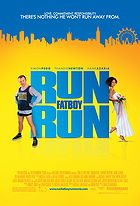 Posted : 16 years, 10 months ago on 15 August 2008 02:37
(A review of Run Fatboy Run)
Posted : 16 years, 10 months ago on 15 August 2008 02:37
(A review of Run Fatboy Run)
Following the lucrative successes of both Shaun of the Dead and Hot Fuzz, actor Simon Pegg steps away from his usual suspects (Edgar Wright and Nick Frost) for something rather different. Pegg and director David Schwimmer (yes - Ross from Friends) previously worked together on Big Nothing. Apparently the wonderful camaraderie between the duo proved so strong that they reunited for Run Fatboy Run. In essence, the film is a British romantic comedy merged with rom-com that provides solid entertainment for a rainy afternoon.
The film is bright, entertaining and fun: not a masterpiece by any means, but it's unfairly pasted and tragically overlooked. It provides sufficient gags (granted they're not memorable), charming characters, an ideal cast and a heart driving the proceedings. Sure the film is clichéd and had the potential to be better, but it supplies enough chuckles to establish Simon Pegg as a leading man and demonstrates that David Schwimmer may have found his calling as a director.
The story of Run Fatboy Run concerns overweight slob Dennis Doyle (Pegg). In the opening scene it's his wedding day, and he's scheduled to marry beautiful pregnant fiancée Libby (Newton). Dennis, however, gets cold feet and leaves Libby at the altar. Five years on we find Dennis still alone and unhappy, working as a security guard at a women's lingerie shop. He still occasionally visits his son and still has feelings for Libby who has not yet forgiven him. Dennis soon discovers that Libby has moved on and is dating a sophisticated, charming American named Whit (Azaria). Of course, Dennis begins to grow jealous. Whit is in training for an upcoming marathon that he's running for a charity. In a desperate effort to win Libby back, Dennis decides to run the marathon as well. But Dennis is an unreliable quitter who has spent his life running away from everything, thus even his closest friends are sceptical about his chances. Dennis' best friend Gordon (Moran) provides him with motivation and driving force to finish the race and prove he's a changed man.
David Schwimmer was always destined to succeed behind the camera. During his Friends days he directed several episodes of the show. With Run Fatboy Run there is obvious potential shining through in Schwimmer's directing. Even with a limited budget, he perfectly captures realistic London locations and manages to maintain a pleasant atmosphere. On top of this, never is there a contrived moment to unearth.
The script was originally set in America, but Pegg conducted a massive rewrite to alter the location to England (because a British company agreed to fund it). However, Pegg's limited involvement with the laughs is painfully obvious. American humour unfortunately dominates the screen too often. Things like nudity, vulgar language, repulsive scenarios and even some racial stereotypes. Perhaps if Pegg got together with his traditional partners in crime, this could have been far better.
As an actor, though, Pegg steals the show. He trudges through the predictable events with spirit and charm. He also manages to make his actions and lines winningly human, and handles the romantic stuff believably.
Dylan Moran is a scene stealer. He pretty much plays his regular character ala Black Books, but that's the role everyone loves him for. I can never get enough of Moran's acting when this character takes flight. The chemistry between Pegg and Moran is something special...maybe Nick Frost could get worried.
Thandie Newton is decent in her role, and then there's Hank Azaria who never appears to fit in satisfactorily.
Overall, Run Fatboy Run is a likeable and refreshing modern comedy. It's riddled with clichés and is underwhelming in the laughs department, however it's pleasant company to keep when you have a few boring hours to spare.
In my opinion, the film is underrated and quite misjudged. It's not in the same league as Shaun of the Dead or Hot Fuzz which is unfortunate, but it was never meant to. It's straightforward predictable comedy; nevertheless if you throw Dylan Moran and Simon Pegg into a scene you have an extremely fun time on your hands.
7.2/10
 0 comments, Reply to this entry
0 comments, Reply to this entry
Spike Lee's masterpiece...
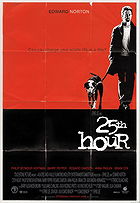 Posted : 16 years, 10 months ago on 14 August 2008 02:06
(A review of 25th Hour)
Posted : 16 years, 10 months ago on 14 August 2008 02:06
(A review of 25th Hour)
Director Spike Lee is an interesting filmmaker. Throughout his lucrative career, Lee has created several films that deeply explore and comment not solely on the respective major characters but also the settings they inhabit. 25th Hour is a multi-layered, elegiac tale of regret, missed opportunity, anger, soul-searching and self-loathing. The film is permeated with profound emotion and rich themes regarding friendship, accountability and masculinity.
Spike Lee perfectly captures the depressive atmosphere of New York City following the devastating 9/11 attacks. Much of the emotion is derived from the gloomy post-9/11 ambiance of downtown NYC, emphasised and highlighted by a key scene set in an apartment overlooking Ground Zero. The film's power is again underscored by the potency of the music: never is it overbearing...the composer keeps the music toned down but unfathomably effective. Director Lee endeavours to include many things in the film, not the least of which is portraying how New York's residents are survivors at heart. This, coupled with the various subtle metaphors and the incredible filmmaking in all aspects, is what makes this Spike Lee's greatest masterpiece.
25th Hour is a story about a drug dealer's search for redemption in his final hours of freedom. Monty Brogan (Norton) has been resigned to a nasty fate. He was found in possession of illegal drugs, and will soon be spending seven years in a maximum security prison. On bail for 24 hours, Monty endeavours to get his affairs in order. As he walks the streets, Monty begins to reflect on his life and how he got into the inescapable situation. Monty attempts to reconnect with his father (Cox) who cannot shake the reality that he is somewhat responsible for his son's fate. Monty also gets together with his girlfriend Naturelle (Dawson) and his two closest friends: Jake (Hoffman) and Frank (Pepper). Even more crucial, Monty cannot avoid the mystery swirling around in his brain of who ratted him out.
The simple plot is just the tip of the iceberg: Spike Lee and screenwriter David Benioff (who adapts his original novel) have woven together a multi-faceted, lamented story that creates engrossing viewing. Director Spike Lee adds a tangible level of anguish to the experience with his decision to not simply set the film in post-9/11 NYC, but also to give the consequences of that tragedy a prominent place in the story. The tone is intentionally depressing. Any sense of hope is deficient - none of the characters care much about the future, merely because, in their differing individual ways, they basically have no future to look towards.
The film's moral standpoint is deliberately ambiguous: while Monty is indubitably guilty of dealing drugs, in no way is he a violent or malicious man - in fact he's quite the opposite as demonstrated in the opening scene during which he rescues a dog that he finds lying in the street, tortured and close to death. Monty also sincerely cares about his girlfriend Naturelle and is never abusive; he also genuinely cares for his father and his friends. However with his contented life effectively terminated, he must decide what to do: running is an option...so is suicide...and both hold some appeal in comparison to what he expects in gaol.
Monty's furious tirade against every ethnic and minority group in the city is probably the most oblique acclamation New Yorkers have ever received. Furthermore, Edward Norton's performance is superb. This is probably the best we've seen him in since American History X: he's believable, unflinching and realistic.
However, the best performance is undeniably delivered by Barry Pepper. The actor is probably best known for his portrayal of the religious sniper in Saving Private Ryan, with a few small-known performances here and there. Pepper's every scene has you engaged and fixated. From his bloodshot eyes gawking at the stock market numbers tumbling past on his computer monitor, to the tragic scene by the river, Pepper emanates a dominant screen presence.
Phillip Seymour Hoffman brilliantly portrays the shy English teacher. Like all the other characters, he's three-dimensional and dosed in a realistic edge.
Rosario Dawson and Anna Paquin are passable as the females of the cast, with a minor appearance of the always reliable Brian Cox.
In essence, 25th Hour is a profoundly intense drama that somehow manages to grasp your undivided attention with the realistic panorama and gripping atmosphere. We're reeled in as Monty must look deep within himself, weigh up his sins and pay his dues before redemption can be earned. All of which makes 25th Hour one of Lee's more thought-provoking and judicious works. However the film isn't entirely well focused and this is a major shortcoming. It strives extraordinarily hard to be various things and serve many causes, in the end compelling the viewer to wonder what much of the content was about. Nonetheless, this causes little irreparable damage, and the film's overall effect remains untouched with its story absorbing. In the end, that's all that truly matters.
The film is still a captivating and enlightening glimpse into the personal drama of a confessed lowlife. It will inspire you to look past the pretty pictures and consider the many metaphors underneath. The 130 minutes in its running time simply flies by. Perhaps some of the sub-plots grow rather preposterous and unnecessary, but the film is deep and gratifying. The final ambiguous montage that closes the film in particular really hits home.
8.8/10
 0 comments, Reply to this entry
0 comments, Reply to this entry
Disappointing...
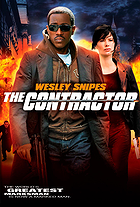 Posted : 16 years, 10 months ago on 13 August 2008 10:10
(A review of The Contractor)
Posted : 16 years, 10 months ago on 13 August 2008 10:10
(A review of The Contractor)
Following recent below average straight-to-DVD actioners such as The Marksman and 7 Seconds, Wesley Snipes continues to institute himself as the new Van Damme or Steven Seagal. It's hardly surprising that actors like Van Damme and Seagal degraded their careers by starring in straight-to-DVD films, purely because their talent is non-existent: they can't act, but they can fire a gun. Wesley Snipes had no reason to be reduced to this quality.
The Contractor is among Snipes' latest movies, and it's essentially a cousin to Mark Wahlberg's successful action movie Shooter. Both Shooter and Snipes' The Contractor focus on former specialist operatives called back into service before ultimately being betrayed and set up. But while Wahlberg's character is aided by a beautiful babe, Snipes gets his assistance from a precocious teenager. The screenwriter is essentially taking a page out of Luc Besson's Léon (also known as The Professional). So there we have it...The Contractor mixes equal parts of Léon and Shooter. However, it isn't as charming and absorbing as the former, or as thrilling and intense as the latter.
Former professional contractor James Dial (Snipes) now lives a secluded life at his Montana ranch. He frequently evokes the memory of failing an assignment several years earlier when he was unsuccessful in eliminating a renowned terrorist. Dial is approached by his former employer who allows him the opportunity for another shot at assassinating the terrorist who is now under heavy protection in London. It will impart personal satisfaction as well as further financial advantages. Dial executes his task, but is then forced into hiding as the British police relentlessly pursue him. He's hurt and hunted, and it isn't long before he crosses paths and dubiously befriends young Emily (Bennett) who doesn't seem the slightest bit reluctant to help a highly wanted man evade justice. Alrighty then...
Wesley Snipes demonstrates that, even with weak career moments under his belt, he can still carry a picture. For an action movie, Snipes brings staggering depth and intrigue to his character. Young Eliza Bennett is doubtlessly the film's biggest surprise. She competently masters her character and flaunts convincing acting skills. She has her unfortunate weak moments though, such as the unrealistically corny relationship with her grandmother.
German director Josef Rusnak keeps the action moving and the pacing fairly brisk. With a terrific cast (for the most part) the film also exhibits plenty of decent drama. However the film is unforgivably marred by the cinematography techniques and the script. The shootouts, especially those towards the climax, simply cannot engage a viewer. All the action fails due to the almost Michael Bay-eque style of filming: fast cuts, shaky handheld shots that aren't properly focused, migraine-inducing strobe lights, and additionally some amateurish film speed manipulations (slow motion, things sped up...and even freeze frames). Some villains can't even hold their firearms correctly which is a sure sign that research was never a priority. The action is entertaining, but could be far more exhilarating.
The movie also fails as a thriller because the twists don't raise the stakes. Additionally, Snipes' James Dial ostensibly prefers to avoid confrontations and gun-fights. Instead, he continually absconds. This could have worked, however with pay-offs so trifling and promising set-ups so common it feels unsatisfying. The screenwriter cannot avoid those dumb action movie clichés either. A gun battle on a construction site occurs, but do the workers or civilians nearby (which we clearly see following the battle's conclusion) care or call the cops? Nope, they don't even notice anything despite plenty of gunfire. And are we supposed to believe an investigation can terminate so suddenly? No paperwork? Come on!
Overall, The Contractor isn't as terrible as I expected. It's also among the best straight-to-DVD films Snipes has featured in, although that is a faint praise. A promising story that clearly takes inspiration from Shooter and Luc Besson's Léon is marred by a below average script and an abundance of stupidity to boot.
5.3/10
 0 comments, Reply to this entry
0 comments, Reply to this entry
Awful...
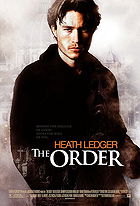 Posted : 16 years, 10 months ago on 13 August 2008 07:47
(A review of The Order)
Posted : 16 years, 10 months ago on 13 August 2008 07:47
(A review of The Order)
2003's The Order (known in the Australia as The Sin Eater) is an appalling attempt at a religious-themed horror movie. The days of The Exorcist and The Omen have come and vanished. While some consider them horror masterpieces, they have dated and are now unspeakably silly affairs. Considering the batch of religious horror movies that crept out and died in the past decade (like Arnie in End of Days and the mediocre Roman Polanski/Johnny Depp film The Ninth Gate) it's amazing that someone took another stab at the genre. This time it's writer/director Brian Helgeland who tries his luck. Considering his previous work on Mystic River, Blood Work and L.A. Confidential one would assume that he could produce a quality product. But Helgeland was also behind A Knight's Tale, and his dreadful screenwriting skills come out to play with this film as well. It seems the writer/director also brought along the cast for A Knight's Tale and plonked them into random roles...whether they suit their assigned role or not. On that note, virtually every performance is terrible.
The Order was subsequently greeted with a terrible critical reception upon release, and to me it seems for good reason. The Catholic Church was apparently extremely displeased with the outcome of this production. Perhaps the Catholics should have sued the filmmakers for defamation of religion. Even better, poor cinema-goers that endured this mess should have sued the studio for defamation of personal time or something.
Father Alex Bernier (Ledger) is a rogue priest. He receives word that the leader of his order has died in Rome under mysterious circumstances. Alex is encouraged to travel to Rome and investigate the death. Naturally, this handsome young priest is accompanied by an attractive young woman. In this case we have former mental patient Mara (Sossamon) who was institutionalised for trying to kill Alex. Now Mara is being sought after by the police...yet she has no problem obtaining a passport and flying to Rome, and of course Alex completely trusts Mara despite her trying to kill him. (Sorry if this explication isn't making any sense...the movie never makes an effort to account for this bullshit either)
Anyway, the clichéd story begins to unfold once the proceedings commence in Rome. Alex learns of a "Sin Eater" in the form of a man named William Eden (Furmann). Basically, a Sin Eater visits the bedsides of dying folk and absorbs their transgressions. Sin Eaters essentially provide a path to heaven outside religion. In return for his services, a Sin Eater becomes fabulously wealthy and is immortal. (This is never adequately addressed either...I mean how can one all of a sudden become wealthy and immortal? Would dead people just pay him?) After a Sin Eater carries out his duties for a few centuries, he needs to pass on the torch. Eden wants to give the task to Alex.
For lack of better word, The Order is pure horror tosh: it's excruciating, confusing, convoluted...and after a while it's just plain boring. There is an interesting premise for sure, but the script spoils the potential. Its cardinal sin as a horror movie is never actually scaring the audience, nor intriguing them. It's tagged as a thriller, but nothing is ever thrilling. It provides little exposition as everything seems to be a melodramatic murder mystery, trudging from one senseless half-baked scene to the next. It simply does not work. Even worse is that the film is never entertaining. By the time some "sin eating" actually occurs, we're already bored stiff and cannot feel exhilarated no matter how impressive it looks. The dialogue in particular is boring and contrived. You don't know whether to laugh or shake your head in incredulity.
The Order is dark, gloomy, absurd, and predictable. People speak in ambiguous riddles, the humour fails, and the sins themselves rise from people's bodies resembling jellyfish. Then finally the ending (which seems to go on forever) takes a completely conventional turn that's more silly than creepy or exciting. Worst of all there's Heath Ledger (R.I.P) mumbling through his tedious lines. He looks incredibly bored to be there, and I don't blame him. Since his career was already far too short, why did he waste his time on this rubbish? He could have developed a far more successful career before his unfortunate death if only he made the correct decisions. Life's too short to be involved in crappy movies. Shannyn Sossamon also falls flat, as does Mark Addy who never develops any charm or reason to like him at all. Peter Weller of the RoboCop fame should stick with the robotic police officer...he's derisorily awful in his role. There are no redeeming performances at all. The Order fails on practically all accounts...it only gets credit for trying.
3.8/10
 0 comments, Reply to this entry
0 comments, Reply to this entry
Intense political actioner
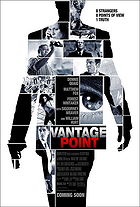 Posted : 16 years, 10 months ago on 13 August 2008 05:06
(A review of Vantage Point)
Posted : 16 years, 10 months ago on 13 August 2008 05:06
(A review of Vantage Point)
At its core, Vantage Point is a hybrid creation: an amalgamation of Akira Kurosawa's Rashomon and the hit television series 24. In fact the film could effortlessly be perceived as a sibling of 24 as it contains intense political drama, terrorism, the President of the United States in peril, and a fairly convoluted conspiracy to uncover. Mind you, what's missing is Jack Bauer (although, to be fair, it does star Matthew Fox who plays a Jack on TV's Lost).
Vantage Point is an imaginative, frantic, nail-biting, gripping political actioner that spends its 90-minute duration illuminating one series of events from different perspectives. Personally, I found the film extremely flawed but underrated. I was dubious to approach the film due to the largely mixed reviews. However, this is an above average attempt at a killer concept. While the film feels incomplete and occasionally thoroughly preposterous, it achieves its goal of providing entertainment. The opening few scenes will successfully reel in a viewer due to the intriguing and compelling nature of the story unfolding. The filmmakers cleverly adopt an effective approach to lensing the action that resembles such modern action films as The Bourne Ultimatum. While this exercising of quick cuts and shaky cam has grown tiring over the years, here it's actually fruitful in its engagement of the audience.
The fundamental story concerns an attempted assassination on the President of the United States, Henry Ashton (Hurt). This basic premise is enlightened with a series of differing perspectives, mirroring recent films like Crash with a slight drop of Akira Kurosawa's Rashomon moulded into the story.
At a landmark summit on the global war on terror in Spain, President Ashton is gunned down. The film then concerns the chaotic ensuing events as the manhunt commences for the shooter. The film primarily involves the proceedings that initiate at midday and conclude 23 minutes later. Bits are replayed from various perspectives: this includes viewpoints of Secret Service agents (Fox, Quaid), President Ashton, an American tourist (Whitaker), journalists and even the terrorists themselves.
Vantage Point is approached with a high level of technical aptitude. Running at a brisk running time of about 90 minutes, the director keeps events taut and engaging. Most commendably, the director is skilled at keeping constant visual continuity. We witness events from multiple angles...sometimes up to even 10 viewpoints courtesy of the media, surrounding buildings, and the various civilians on the ground mixed in the chaos. The intensity and turmoil following bomb detonations and bullets fired is enough to echo the collapse of the World Trade Center on that fateful day in 2001. The final 20 minutes shift the film's tone from drama to action. There's a terrifically filmed car chase blended with various other action-packed happenings.
However, the film's primary faults are in its script. At times the dialogue sounds natural, but at other times contrived. At several times you'll be tempted to laugh at the dialogue. For example, Quaid's Agent Barnes finds the President heavily bleeding. Barnes inquires "Are you injured?" The multiple story-line approach does work to an extent, but only selected characters are delved into in any degree of depth. We're supposed to care about the various characters as we watch their stories; however it's impossible with insignificant time allocated for character development. As typical betrayals happen, we never understand why. Then there are the loose ends. We become so involved in all the excess supporting characters without a pay-off. Some characters appear to be established in the opening scenes...only to disappear entirely. Because these characters are slightly developed, we become curious about them. There are too many questions without answers.
I also briefly mentioned the stupidity of the film. Towards the final confrontation, things become extremely silly as characters are quick to draw guns on each other, and the stunt driving for the final car chase is too unbelievable. Another thing is the failure to give the story any level of credibility. We never believe the story for a single minute simply because the concept could never happen. And then of course the clichés are also in place, like the never-ending clips in firearms and a customary character betrayal. Yes, the film is entertaining...it's just too silly to live up to its full potential.
Dennis Quaid is no Kiefer Sutherland. Where Sutherland in TV's 24 has a deep voice and instils incredible intensity to a situation, Quaid usually falls flat. Matthew Fox found fame in the television series Lost. I never liked his acting in that show, and I still don't like his acting here. He simply takes himself too seriously and his eagerness always shines through in all of his acting. Forest Whitaker is an Oscar-winning actor who never appears to do much in the film. He has a video camera, yes, but the rest of the film he's endlessly pursuing people and trying to help. The screenwriter never grants him a moment to shine. Whitaker's relationship with a young girl also feels out of place and superfluous. Also in the supporting cast there's William Hurt, Edgar Ramirez and a cameo appearance of Sigourney Weaver. Many of these actors are underused.
Overall, Vantage Point has its flaws but it's an extremely entertaining movie. The competency behind the camera is palpable with solid direction and an ear-shattering sound mix. The action is frequent and exciting, even if there isn't much point to it. Maybe with more depth and a heightened intelligence level the film could have achieved its potential.
Vantage Point, which was initially dosed in realism, enigmatically shifts its mood in the concluding 15 minutes; staggering into clichéd action-thriller territory with a car chase that, while exhilarating, does not seem appropriate. Likewise, you'll undeniably snigger as Quaid belies the realism, becomes indestructible and, once the action has receded, conveys some of the cheesiest lines this on side of Top Gun. Sadly the film loses its grip and abandons the brutal tone. This film merely reminds us how fantastic the Jason Bourne franchise is for its virtually unequalled ability to have never crossed the line.
7.1/10
 0 comments, Reply to this entry
0 comments, Reply to this entry
Impressive vigilante actioner!
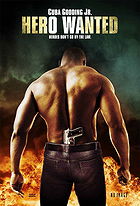 Posted : 16 years, 10 months ago on 12 August 2008 10:21
(A review of Hero Wanted)
Posted : 16 years, 10 months ago on 12 August 2008 10:21
(A review of Hero Wanted)
Vigilante action thrillers are common occurrences in contemporary Hollywood. Films such as The Punisher have utilised the concept of revenge for an interesting actioner. Jodie Foster in The Brave One toyed with the concept of an innocent civilian fulfilling the duties of a stereotypical vigilante hero. Hero Wanted is a creditably gritty, exciting revenge flick unlike any of its genre forerunners. This is a tragically overlooked and underrated film featuring several great actors and a realistic portrayal of man's darker side. It's rare indeed for a movie to probe that area of human nature with this level of established veracity and pragmatism in the tone. The filmmakers deeply delve into man's desire for their 15 minutes of fame, and the consequences of "being a hero". However, in spite of exploring these deep themes so effectively...the clichés sporadically break through. On the whole, things feel quite formulaic and occasionally predictable. But there is enough taut action and proficient filmmaking on exhibition to bestow a wholly entertaining experience.
Liam Case (Gooding Jr.) is a despondent garbage man who lost his wife several years ago in a tragic car accident. Now he's an alcoholic sincerely depressed with his insignificant existence. However his life finds further meaning when he witnesses a flaming car wreck unfold. Liam instinctively dives into the situation and rescues a little girl who was trapped in the flames. He subsequently becomes a hero and the city loves him. Following his short period in the spotlight, people move on and forget his heroic act. He therefore returns to his former depressive existence. His heroic instincts are kicked back into action again, however, when he's inside a bank during an armed robbery. The attendant, who he has a crush on, is shot by the robbers and she falls into a coma. Liam decides to search for the gang of robbers and dispense justice on them.
Hero Wanted bypassed a worldwide cinematical release...instead in most countries it went straight to DVD. In my opinion the film is a sleeper hit. The technical aspect of the film in particular never feels amateurish. The early action sequences are highly impressive: short, tight, explosive and exciting. Even better, the typical shaky cam and quick cutting isn't heavily utilised. The concluding action scene exercises clever dolly shots and wide angles to tell the story. For the most part, the editing is above average. On top of this, pulse-pounding music and a booming sound mix to keep an audience engaged. The action is also grounded in realism and credibility: guns are reloaded, people bleed, and no-one is invincible. The strong graphic violence packs an overwhelming wallop.
With such a competent team behind the camera, the colossal script failings are unfortunate. The script is repeatedly dragged back to traditional action movie hackneyed themes and theatrical devices. The final 30 minutes grow increasingly preposterous as well. Moreover, the out of place ending proves quite disappointing. It seems too happy and predictable. Characters are treated with too much sentimentality and it's clear the filmmakers were pushing for a "feel good" kind of ending with a smidgen of darkness to its tone. The plot frequently meanders as well with supporting characters introduced for the sake of a violent death. The film's twist proves quite shocking and effective...however it just isn't executed with any style. Much of the dialogue that occasionally sounds intelligent is marred by the contrived profanity.
Cuba Gooding Jr. is a convincing protagonist. He successfully nails the different facets of his character: from a raging alcoholic to a worried man trying to keep everything under control.
Ray Liotta seems quite underused, but he appears determined. The rest of the cast are all equally impressive. Thomas Flanagan's villain is particularly effective and sinister when it's called for.
Overall, Hero Wanted may not be the best vigilante movie ever made or a masterpiece either. Nevertheless, this flick really surprised me. It features a stellar cast, top notch production values and technical proficiency especially during the intense action sequences. It will keep you entertained.
6.9/10
 0 comments, Reply to this entry
0 comments, Reply to this entry
 Login
Login
 Home
Home 183 Lists
183 Lists 1670 Reviews
1670 Reviews Collections
Collections